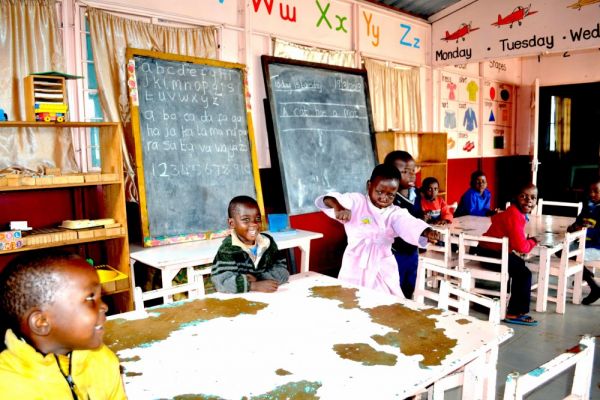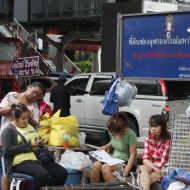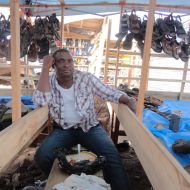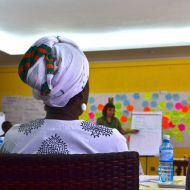As Kenya’s Government Goes Local, the Informal Realm Hopes to Get Its Ear

Stuck in gridlock in one of downtown Nairobi’s infamous traffic jams. As the country’s newly devolved system of government officially goes into effect this week, residents hope such local problems will get more attention. Photo credit: Sam Sturgis
Like many of her fellow Kenyans, Faith Njagi awoke extra early on the morning of August 4, 2010. It was a big day – a day to change her country.
On her mind was the question drawing millions out of bed before sunrise: “Do you approve the proposed new constitution?” It was a question she would soon have to answer not just in theory, but on a paper ballot. Its magnitude led to voting lines that snaked through entire neighborhoods that day, as citizens waited patiently for their opportunity to affect what they hoped would be a transformation of Kenya and their daily lives.
“I voted because I wanted change,” says Njagi, a desire that was apparently shared by many others – the new constitution won a resounding vote of confidence at the ballot box. Final poll results indicated that at 67 percent — nearly six million Kenyans – were in favor of scrapping a constitution that had been around since the country gained independence in 1963, and putting in its place legislation that would drastically devolve a government that has a history of centralizing power. Only 30 percent of voters signaled their opposition to the referendum.
But on a recent rainy day in Kibera, one of Nairobi’s largest informal settlements, the fundamental change that people like Faith Njagi voted for two years ago is still hard to find.

Faith Njagi’s class was emptier than usual on a Wednesday morning. Rainy days often prevent children from getting to school in Kibera. Photo credit: Sam Sturgis
“We have so many expectations, but they haven’t been met,” says the early-education teacher, her small classroom uncharacteristically empty on a Wednesday morning. “The mud is just too much for the small ones,” she explains, gazing out the window in search of parents carrying their children up the nearby hill – a slum, and an informal school, at a virtual standstill due to that morning’s rain.
Njagi and the donor-funded school where she teaches is just one of Nairobi’s numerous education facilities that operate without the support of the Kenyan government, despite the 2010 constitution stating that free “basic education” will be provided to all school-age children. “They talk about free primary education, but it’s not free at all,” Njagi says. She points out that families living in Nairobi’s informal settlements are typically forced to pay for uniforms, books and food – expenses that many of the city’s poorer families, especially those who live and work informally, can’t afford.
But while she admits that little has changed since she voted for a new constitution in 2010, Njagi’s optimism has lasted against all odds. “If the constitution is implemented, I think it could bring the institutional change we need,” she says.
Indeed, such institutional change is finally on the horizon. Yesterday the city, which also governs Nairobi County, swore in its own governor for the first time in history. Moreover, along with the newly created Ward Representatives, numerous informal settlements like Kibera will be represented by their own members of parliament for the first time ever. (Previously, Kibera fell under the Langata constituency, which simultaneously represented the neighborhood of Karen – one of Nairobi’s wealthiest).
Nevertheless, while informal businesses, settlements and institutions will have more direct representation under the new constitution, some argue that those operating informally shouldn’t view the legislation as a silver bullet that will make free education, housing and jobs suddenly available. Without active organization, they say, little change will come to populations that operate in the informal realm.
“The challenge with informality, whether it’s informal settlements or the informal economy, is that they don’t speak with one voice,” explains Professor Winnie Mitullah. “It’s going to be in the hands of the informal sector to organize themselves.” Otherwise, she says, they’re unlikely to gain much political clout.
Mitullah, director of the Institute for Development Studies at the University of Nairobi, is also a member of the Government Task Force on Devolved Government, and a strong advocate for the new system despite the challenges it will present. She emphasizes that Nairobi’s informal sectors have historically been prone to manipulation and exploitation by those seeking electoral votes, and so a devolved system is the best way to foster government accountability. “People have a right to be optimistic,” she says, “but they need to demand their constitutional rights.”

Uhuru Kenyatta, son of Kenya’s first President, Jomo Kenyatta, will lead Kenya as it transitions to a devolved government. Photo credit: Sam Sturgis
Fully grasping one’s rights may prove to be a significant challenge, however. With 21 chapters and over 280 articles, comprehension of the lengthy document would be difficult for anyone, let alone Nairobians who live without formal education. Moreover, thanks in part to President-Elect Uhuru Kenyatta’s pledge that all students entering primary school will receive solar-powered laptops, realistic expectations of what the devolved government can provide may be equally hard to come by.
“It’s a complicated document for people who don’t have much education. How will they know what their rights are?” asks George Wasonga, Program Coordinator at the Nairobi-based Civil Society Urban Development Programme (CSUDP). Echoing the tone of Professor Mitullah, Mr. Wasonga sees Nairobi’s civil society as active and passionate when it comes to the issues affecting the informal realm, yet it’s often splintered and at the mercy of donors.
“Every other civil society organization (CSO) that can get some funding is trying to organize,” he says. According to CSUDP figures from 2011, however, over 30 percent of Nairobi’s CSOs are dedicated to health and finance alone. While those issues are certainly important to Nairobi’s informal population, only four percent of the city’s CSOs are operating in the governance sector – possibly the most important arena as the city transitions to a devolved system.
“I’ve never faulted the laws of Kenya, I’ve faulted the people,” says Mr. Wasonga. “It’s your right to demand what’s outlined in the constitution.”
So as Nairobi gets set to welcome a new president, governor and countless bureaucrats tasked with representing the city’s informal settlers and workers, the waiting game begins. Will the constitutional rights of informal populations actually be made manifest? And if not, will the people rise up to demand change?
For now, Faith Njagi is just hoping for the mud to dry – the weather is forcing her to start her class late. I ask her what would happen if she had the opportunity to meet the new education officials. “Oh, I could do so much!” she cries.
Perhaps now she’ll get the opportunity.









